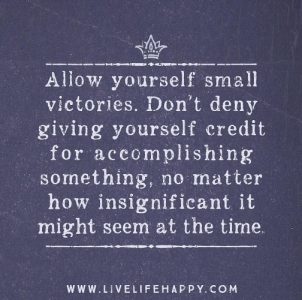– Meghan Chen
Let’s just get this out of the way first: everyone’s story is different, and I’m not going to even pretend to know what it feels like to have lived yours. If you told me your story, I couldn’t tell you that I understood – because I really don’t, and never truly will as long as I keep seeing the world through my own two eyes. What I do understand, though, is that your story matters. Even if it feels routine, or small, or punctuated by tears. It matters, because you are here for another day, and that matters.
It matters that you picked your head up off the pillow today. It matters that you got up, brushed your teeth, had a piece of toast or a glass of milk. It matters that you found your way to this website and are reading this right now. All those things are victories, small wins against the voice that told you that you couldn’t do any of those things today. They might be little things, but they matter a whole lot.
And many little things that matter add up. They become a big thing that matters very much: progress. Progress doesn’t have to look like stopping your medications tomorrow or going to the gym three times a week. It can look like calling a friend when all you want to do is lock yourself in your room. It can look like walking the dog, or just playing with the dog. It can look like opening the blinds, even just a crack, and letting the sunlight pour in. If the windows were boarded up yesterday, that’s not just a little thing – that’s big progress. Big progress, small progress, it all matters.
So today, maybe try paying attention to your little victories, to all these little things that matter so much. Maybe write them down and make a list, so that the little things that matter become a bigger thing that matters even more. Try reading that list, and you just might realize how much it matters that you did all of those things when just the day before, you didn’t think you could do any of them. Yesterday, you might have felt as if nothing mattered. But every little step, every little thing that matters, is a step towards believing that you matter. And you know what? That matters.
*If you’re interested in learning more about the impact that activity monitoring can have on depression, this study suggests that self-monitoring of activity has been correlated with improvements in mood; and this video by the Beck Institute for Cognitive Behavior Therapy discusses how keeping an activity log can help with tracking progress between treatment sessions.
